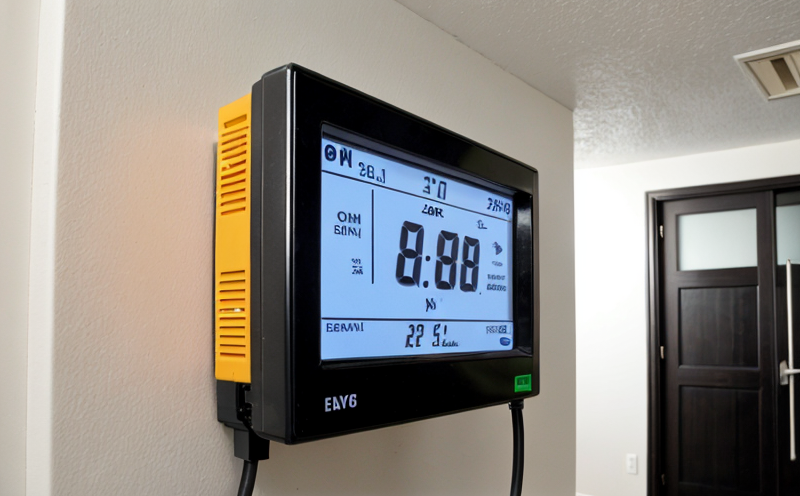Energy Efficiency Testing
In today’s rapidly evolving energy landscape, ensuring that products and systems meet stringent efficiency standards is crucial. Energy efficiency testing plays a pivotal role in this context by providing comprehensive analysis of the performance characteristics of various components used in renewable and traditional energy sectors. This service is designed to help manufacturers, developers, and researchers ensure their innovations are not only environmentally friendly but also compliant with global regulations.
The primary goal of energy efficiency testing is to evaluate how effectively a product or system converts input energy into useful output without unnecessary loss. This involves assessing parameters such as power consumption, heat generation, electrical resistance, and mechanical efficiency. The tests are conducted using state-of-the-art equipment tailored to the specific requirements of each application.
For example, in the context of renewable energy, we test photovoltaic (PV) panels by measuring their output voltage under standard illumination conditions. This helps determine the panel’s ability to convert solar radiation into electricity efficiently. Similarly, in traditional energy systems, turbines are tested for their aerodynamic properties and power generation capabilities.
Another critical aspect of energy efficiency testing is understanding how different materials and designs affect overall system performance. For instance, when evaluating insulation materials used in buildings or cooling systems, we assess their thermal conductivity and durability under varying environmental conditions. This ensures that the chosen materials offer optimal energy savings while maintaining structural integrity and longevity.
Compliance with international standards such as ISO 5208-1 for electrical resistivity measurement and ASTM C176 for concrete compressive strength testing further enhances the credibility of our results. By adhering to these benchmarks, we provide clients with data that is universally recognized and accepted within the industry.
Our team comprises highly skilled professionals equipped with advanced knowledge in both theoretical physics and practical engineering. They employ cutting-edge methodologies to conduct tests that are precise and repeatable. The use of sophisticated software tools allows for real-time analysis during testing, ensuring accurate readings even under challenging conditions.
Moreover, our services extend beyond mere compliance; they aim at continuous improvement by identifying areas where further optimization can be achieved. Whether it’s refining the design of a new HVAC system or enhancing the efficiency of industrial machinery, we work closely with clients to achieve their goals efficiently and effectively.
Applied Standards
The field of energy efficiency testing is governed by several internationally recognized standards that guide best practices. These include ISO standards like ISO 5208-1 for measuring electrical resistivity, which ensures consistent measurement methods across different laboratories worldwide.
| Standard | Description |
|---|---|
| ISO 5208-1 | Mechanical testing of metals—Determination of electrical resistivity by the four-point method |
| ASTM C176 | Determining compressive strength of hydraulic-cement concrete |
| IEC 62301 | Communication networks for buildings and civil engineering works—Requirements for building automation and control network systems |
| EN 50608 | Communication networks for power generation, transformation and distribution equipment—Requirements for communication networks in the power sector |
The adoption of these standards ensures that all tests are conducted uniformly across various jurisdictions, thereby facilitating easier international trade and collaboration between stakeholders.
Industry Applications
Energy efficiency testing finds application in numerous sectors including renewable energy, HVAC systems, industrial machinery, and building materials. In the realm of renewable energy, we test photovoltaic panels to ensure they meet international standards for maximum power point tracking (MPPT) algorithms. This helps improve the overall yield of solar farms.
For HVAC systems, our tests focus on air handling units (AHUs), chillers, and heat pumps. We measure their energy consumption rates under various load conditions to identify potential improvements in design or operation settings. In industrial machinery, motors are tested for their efficiency levels over time, helping manufacturers develop longer-lasting and more efficient products.
Building materials such as insulation foams and composite panels undergo rigorous testing to assess their insulative properties accurately. By adhering strictly to standards like ASTM C176, we guarantee accurate assessments that contribute significantly towards sustainable construction practices.
Competitive Advantage and Market Impact
Compliance with energy efficiency regulations is not only a legal requirement but also serves as a key differentiator in the market. By offering reliable testing services aligned with global standards, companies can demonstrate their commitment to environmental sustainability while simultaneously enhancing product quality.
Clients who choose our services benefit from faster time-to-market due to reduced development cycles and increased confidence in their products' performance capabilities. Additionally, successful completion of these tests opens doors for certifications that are highly valued by customers and partners alike.
The demand for energy-efficient solutions continues to grow as governments worldwide implement stricter environmental policies aimed at reducing carbon footprints. Being able to offer robust testing services supports businesses in meeting these demands proactively rather than reactively, thus securing their positions within competitive markets.





